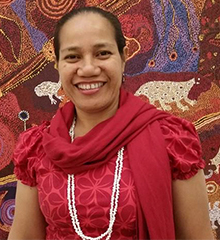
A University of Queensland TC Beirne School of Law PhD graduate has received a prestigious grant to work with UQ researchers on developing her thesis recommendations into practical guidelines for law reformers in the Pacific Islands.
Samoan-born Dr Lalotoa Mulitalo was one of three recipients of a Greg Urwin Award, a $25,000 joint government grant bestowed on exceptional Pacific Islander professionals, researchers and emerging leaders.
Recipients take on three-month placements with organisations that have the potential to drive positive development in the Pacific Islands.
Dr Mulitalo arrived at UQ last month to begin her placement at the School of Law, which will end in May.
Under the supervision of her former PhD advisor, Professor Jennifer Corrin, she is developing a guide to help legislative drafters and government shape laws that are relevant and suitable for the Pacific Islands.
Dr Mulitalo said she was eager to return to the School after her positive experience as a PhD student.
“I’m excited to come back to an environment which is so conducive to research, with its excellent learning and research facilities and the unwavering support of academic and professional staff,” she said.
For Dr Mulitalo, law reform is a key issue for the post-colonial Pacific Islands – a region caught between customary and modern law.
“The issue for me and for many Pacific Islanders is the legitimacy of the laws we pass for the people,” she said.
“Now we’re consciously checking whether the laws we created when we first became independent are actually still relevant.
“For example, when we look at Indigenous societies, it’s clear that their traditions and customs are more respected than modern laws.
“I would say about 90% of people in Samoa and other Pacific Island nations defer to the traditional legal system. Most people living in the villages had no input into modern laws and therefore have no regard for them.
However, Dr Mulitalo said the traditional legal system was rarely acknowledged by Parliament or the judiciary.
“When making decisions, they immediately defer to the Constitution,” she said.
“There should be give and take from both sides. We need the modern system to survive in the world and progress, but at the same time, we must uphold and respect our traditions and customs.
“This legislative drafting guide will look at how a contemporary legislative drafter can take account of both the traditional and modern legal systems to produce and promote laws that are clear, practical and relevant for everyone.”
For many years, Dr Mulitalo has worked tirelessly to create change in this space.
Late last year she became the local coordinator of the Certificate in Law Programme (Civil), designed and supported by academics from the University of the South Pacific School of Law, Vanuatu.
The program is tailored to members of Parliament in Samoa, teaching the basics and principles of law and law making from within Parliament. At the same time, MPs are challenged as to how they filter in every day customary values, principles and norms into the modern laws they debate and pass.
In June, she will begin her new role as Executive Director of the Samoa Law Reform Commission (SLRC), conducting research and developing recommendations on law reform projects referred to the SLRC from key figures including the Hon Prime Minister of Samoa and the Attorney General.
She has also converted her PhD thesis “The consequences of legal pluralism for law reform in the South Pacific” into a book, pending publication. This work was partially funded by the School.
Dr Mulitalo said her interest in law reform stemmed from her time as Parliamentary Legal Counsel to the Samoan government.
“It wasn’t until I left that role that I questioned the relevance of the draft bills and regulations I was drafting for society; that’s what inspired me to start my PhD,” she said.
“When it comes to drafting laws, every single line you write has a lot of impact on every person in your country.
“I thought, if I can create laws that are useful and relevant to everyone, then I’ll be making a difference.”
Dr Mulitalo said she hopes the next generation of young lawyers will take up the mantle and continue her work and research.
As her supervisor, Professor Corrin said Dr Mulitalo was a “worthy recipient” of the Greg Urwin Award.
“Her research and writing steps away from the Western paradigm of law reform by highlighting the importance of customary law and local culture and providing space for them to flourish,” she said.
“Dr Mulitalo has the rare combination of academic and practical skills, combined with insight into Pacific culture.
“Her enthusiasm and willingness to explore new approaches to law reform result in work which will be of great benefit to the region.”



